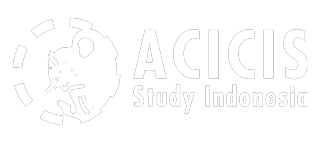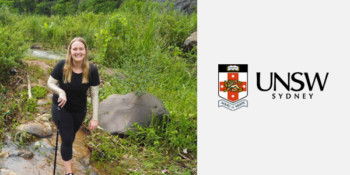Grace James is a participant in the 2020 Law Professional Practicum from the University of New South Wales. Grace is studying a Bachelor of Laws, Bachelor of Arts. She received a $3,000 New Colombo Plan Mobility Grant to support her participation in this program.
Q: Why did you decide to undertake the ACICIS practicum?
I had a friend who completed the journalism program the year prior who loved her time in Indonesia. I would have thought earlier about doing the program but was unaware law was offered until I saw it advertised on the global notices page on my University website. As someone who loves to travel, meet new people and experience other cultures I knew I had to apply considering that not only does the program allow me to fulfil my travel goals over summer but as an added bonus I got to complete a university course as well.
Q: Did you receive a New Colombo Plan Mobility Grant? If so, how did this contribute to your experience in Indonesia?
Yes, I was extremely appreciated to receive the New Colombo Grant. It allowed me to worry a bit less about finances because it pretty much paid for the ACICIS course fee. This allowed me to use my savings for flights, accommodation and my weekend adventures.
Q: How will the Professional Practicum benefit or influence your future career?
To undertake an internship overseas with the help of the NCP grant is not something that comes around often. It is an opportunity that university students can choose to experience and I am beyond grateful that I made the leap of faith decision to partake in it. The language classes were extremely in depth and I was able to learn basic Bahasa Indonesian a lot quicker than I thought. I hope to retain and hopefully improve this skill on my return to Australia so I am able to achieve a goal of mine of being bilingual. I think knowing another language is not just a benefit of travel but it is as the saying goes ‘a cherry on top’ on your resume to distinguish you from others.
In addition, I was able to meet and network with some amazing experts in the legal field and discuss topics I am passionate about such as child marriage and migration issues. They were able to provide advice about career paths and university degrees, which was extremely helpful.
Further, my four weeks at Indonesian Corruption Watch enabled me to experience what it would be like work in an NGO. I was able to observe their daily activities, prepare presentations and papers and communicate with corruption experts which helped me become more knowledge about corruption as a significant issue within Indonesia and globally.
To top it off, being able to immerse myself in a new culture allowed me to develop cultural awareness and cultural communication skills, which I think, are not beneficial for future employment positions but are beyond helpful for life in general.
Q: What organisation did you intern with?
I was interning with Indonesian Corruption Watch. Here I was able to research different issues of corruption, some that I never would even think of an issue. Some of the issues were food importation, unjust enrichment, illicit corruption, political corruption and its relation with the violence in West Papua and how migration and corruption are interrelated. I was then able to present my findings to the office weekly on whatever topic was the focus of that week.
My organisation was also kind enough to take me to other NGO’s and corruption related institutions including the KPK to ask questions and learn more about how corruption is fought.
Q: How have you found the work culture of your host organisation? How is it different to work experience in Australia?
The work culture is different in some ways and similar in others. In Indonesia my NGO was based in a house, which allowed everyone to eat together in a dining room, providing a very homely feel. Similar to Australia, my host organisation was very welcoming and hospitable which made me feel welcomed and comfortable.
The main difference was the relaxed nature of ICW. My first week was quite slow and I felt like I didn’t have a lot to do, however, I soon realised that the culture in Indonesia and the saying ‘Jam Karet’ really is true for daily life. The slower and more chilled work environment made for a more relaxing and less pressure intensive work environment.
Q: Would you like to return to work in Indonesia again in future?
Prior to the program I never really considered working in Indonesia in the future. However, after falling in love with the city of Jakarta it is defiantly something I would consider. I would love to work diplomatically to foster positive relations between Australia and Indonesia.
Q: What do you like to do in your spare time in Indonesia?
During my spare time I often hung out with other ACICIS students and can happily say I have friends in every state and now as the students from the program came from everywhere. We would often go to the markets, local tourists sites such as Monas, different restaurants, karaoke, the movies and of course the Malls (the aircon in them is lovely!). Other nights if we wanted to stay in we would often just get grab-food, which was cheap and delicious, and hang out at someone’s accommodation.
Q: Favourite Indonesian word/phrase?
I know it is basic, but I love to be able to communicate thanks so it would have to be Terima Kasih!
Q: Favourite place to eat? Favourite Indonesian food?
My favourite place to eat and something I have already been craving even in the short time I have been home is food from a local Warung near my workplace where we would grab lunch from each day. If you are at ICW, make sure you ask them about the Warung called ‘Flood’ (it is called that because it is based in lower ground and often floods) and try the tempeh and beans, I promise it will be the most delicious food you eat!
In addition to this, I loved nasi goreng with ayam (fried rice with chicken) and crazily, the Indonesian Pizza Hut is way better than home, so give that a go one night when you want to stay in as well!
Q: What places in Indonesia have you visited during your practicum so far?
I was very lucky to be able to travel a bit on the weekends during the LPP. Each weekend I would go somewhere with a group of friends and so here is a highlight of things we did in each location.
Yogyakarta – Watching the sunrise at Borobudur temple was phenomenal, riding a bike through local villages was also incredible until my one and only battle with food poisoning begun haha. I would also recommend doing a jeep tour at the base of the volcano, that was a lot of fun!
Bogor – I would have to say this was actually probably my favourite place I visited. We organised a day tour there, and our guide was marvellous. We had a lot of fun white water rafting, relaxing in hot springs and visiting an amazing waterfall hidden in a rainforest canyon.
Thousand Islands – While the boat trip was a “bit” choppy it was well worth it for the amazing scenery that this area of earth provided. I am a keen snorkeler and I have to say this would have to be up there in my top 3 snorkelling spots now. We stayed in tents on Pramuka Island and got a local man to take as out on his boat to nearby snorkelling spots and crystal clear beaches. I remember sitting on a new local friends boat as the sun was putting on a show as it was going down thinking ‘pinch me’, this is just amazing.
Bandung – This was a cute town, although the macet (traffic) was terrible because it is so popular with everyone! We got to train to Bandung, which provided fabulous views. I did some shopping here and bought some art from the fabulous Braga Street and I also succumbed to my cravings here and went to western café and got an amazing burger. We also explored nature here and went to an incredible canyon after hiking through what I would describe as quick mud haha. A local man helped us get down the waterfall into the canyon and it would have to be one of the most spectacular natural locations I have ever been.


